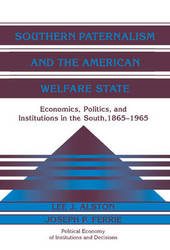
|
Southern Paternalism and the American Welfare State: Economics, Politics, and Institutions in the South, 1865-1965
Hardback
Main Details
| Title |
Southern Paternalism and the American Welfare State: Economics, Politics, and Institutions in the South, 1865-1965
|
| Authors and Contributors |
By (author) Lee J. Alston
|
|
By (author) Joseph P. Ferrie
|
| Series | Political Economy of Institutions and Decisions |
|---|
| Physical Properties |
| Format:Hardback | | Pages:184 | | Dimensions(mm): Height 229,Width 152 |
|
| Category/Genre | Political economy |
|---|
| ISBN/Barcode |
9780521622103
|
| Classifications | Dewey:361.65097309034 |
|---|
| Audience | | Professional & Vocational | |
|---|
| Illustrations |
16 Tables, unspecified; 2 Line drawings, unspecified
|
|
Publishing Details |
| Publisher |
Cambridge University Press
|
| Imprint |
Cambridge University Press
|
| Publication Date |
13 January 1999 |
| Publication Country |
United Kingdom
|
Description
Combining insights from economics, political science, and history, Professors Alston and Ferrie show how the timing and extent of the growth of the American welfare state from the Civil War until the mid-1960s was influenced by the Southern agricultural elite. Before the mechanization of Southern agriculture, the rural landed interests had an economic incentive to keep labor cheap and dependent. They accomplished this through their disproportionate political power at the local, state, and national level, which enabled them to maintain a discriminatory legal environment and prevent federal interference in labor relations.
Reviews"...the book is a success." Douglas W. Allen, "This book is important reading for those interested in political economic, historical, and instituitional analysis that makes clear and provocative arguments about the evolution of the Southern economy and the federal welfare state. Furthermore, the authors always attempt to reconcile their ideas with the available empirical facts, and the resulting interplay of theory and historical experience is enlightening." William J. Collins, Southern Economic Journal "Students of the modern South will find valuable insights in this example of the 'new institutional economics' and also appreciate that the book is gracefully written with very little reliance on jargon." Roger Biles, The Journal of American History "Alston and Ferrie offer an intriguing example of why it is important on occasion to step back and take a look at the big picture." Daniel Clark, Labor History "This is a solid and valuable study. This book represents an important contribution to the study of labor relations and economic change in the American South. The authors argue persuasively that southern planter resistance to federal welfare policies involved much more than a devotion to cheap labor and a fear of outside interference." Enterprise & Society "The author's arguments are persuasive and do much to document adequately what conventional wisdom has long known: The Southern elite used its political and economic power to maintain a dependent labor force and espolited racial violence by lower-class whites to impel paternalism among black workers. Historians will not question the use of sociology and political science to augment the literatures in economics and history for this study." Agricultural History "In this important book, Lee Alston and Joseph Ferrie not only address the complexity of southern paternalism, but also carry forward the task suggested by their title--explaining how southern political interests affected the timing and expansion of the "welfare state" legislative program in the U.S...The main argument of the book is skillfully presented and convincing...The book performs several valuable services for the economic historian." EH.NET, Craig Heinicke, Baldwin-Wallace College "This book represents an important contribution to the study of labor relations and economic change in the American South." Enterprise & Society
|